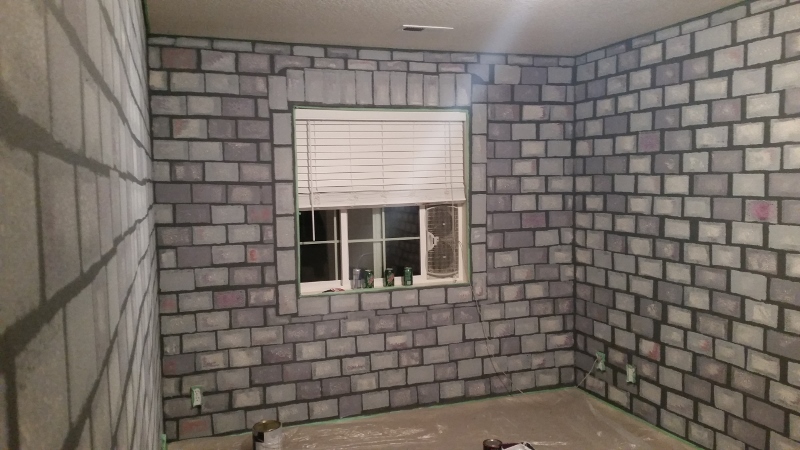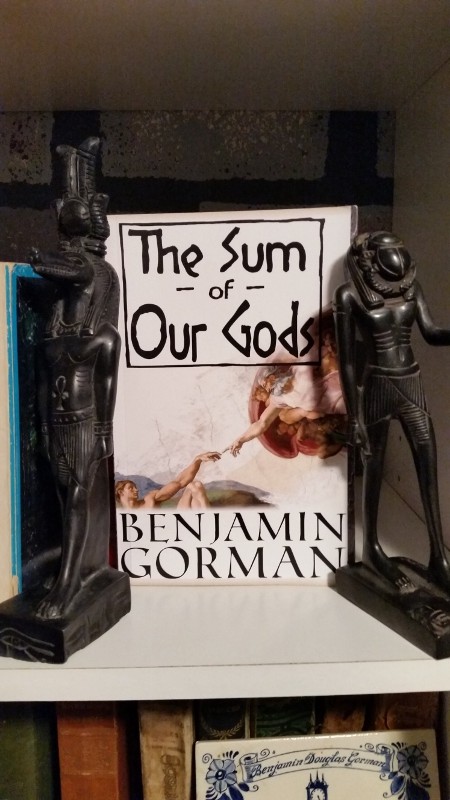[The last time I crowdsourced the editing of one of my short stories, I got some very helpful feedback, so let me know what you think in the comments section below!]
The Parable of the Good Employee
by Benjamin Gorman
When the employee came into the boss’ office, she found him nearly bouncing in his chair with excitement.
“I’m glad to see you today,” he said. “I’ve had an excellent idea, an epiphany, a eureka moment! This is going to be awesome!”
Her shoulders tensed, and skepticism tightened her stomach. Her job was simple. She delivered food and medical supplies to people who needed them. The people came to the entrance to the tent each day, formed a little crowd or a ragged line, and she carried small packages from shelves to their waiting hands. She always carried a suspicion with her, the sense that her entire occupation was a waste. After all, her boss sat at a desk in an office which was just a separate part of the same tent. He could easily rise from that desk at any moment, begin passing the supplies to the people, and she would be unnecessary. Sure, he wouldn’t smile at the people, but how much are smiles really worth?
Her boss was smiling today, and this made all smiles suspect.
“So, here’s my big idea! Today, when we open the tent, the people will be surprised to find that there’s nothing inside!”
“Like, no food or supplies?”
“No,” he frowned. “That would be terrible. No, they wouldn’t see anything. It would still all be here, but they wouldn’t be able to see it. See, we’ll cover the inside the door with a couple big sheets of black butcher paper. Then, when I motion to you, you’ll run and burst through. They already like you. I’ve seen them smile when you arrive. But today, there will be this little moment of worry, and then you’ll appear, and they will love it. It’s going to be great.”
She thought this idea was a great example of the way stupidity can easily become cruelty. The people wanted their food and supplies, not a show. But maybe she was wrong. They did seem to like her smile. It felt good to hear that her boss had taken note of this. Maybe this wasn’t all bad.
So she agreed to give it a try. The people arrived as they always did. They milled about, waiting for the tent’s door to open. But today, instead of opening it herself, she stood back and watched as her boss unzipped the door and revealed the flat, black, paper wall.
The people did not shout in anger. They did not make any of those up-turning noises of curiosity. The silence was disconcerting.
Her boss, now inside his homemade paper wall, raised a finger for her to wait. He held it up until she could feel a full day’s perspiration already lining her armpits. She held a bundle of food under one arm and a bag of medical supplies under the other. They were not evenly balanced, so her lower back began to ache. Finally, her boss spun his hand, urging her forward.
Obediently, she ran at the paper wall. He’d stretched the two sheets horizontally across the tent’s entrance. Her shoulder tore through the one on top, and her knee pierced the other. She stumbled a bit, and that turned out to be a blessing. As she regained her feet, she smiled and laughed at herself. The people saw this grin, knew they were being entertained, and laughed. Then some polite applause broke out, punctuated by a few claps that seemed more than polite.
She handed the bundle of food and the bag of supplies to the first pair of waiting hands, then headed back into the tent, ducking between the torn paper as she went. Inside, her boss was beaming.
“They loved it! Did you see that?”
She nodded. Yes, she’d seen their pleased reaction.
“So cool!” her boss shouted. “I’m going to go call the higher-ups. They’ll love this story!”
She shrugged and got back to work.
The next morning, her boss was actually standing outside his office as she came in.
“Today is going to be even better. I found this old refrigerator box. I cut it into a single sheet, spread it to the posts, and stapled it. I think, if you run right at the middle, it will tear along the seam and you’ll come exploding out. It’ll be great!”
The show had been kind of cool the day before, she admitted. Why not?
So he opened the tent, made her wait a second, and then motioned to her just as he had the day before. She charged at the cardboard. It did split along one seam. Mostly. The cardboard ripped out from under the staples on one side, so after she was through, half of it hung askew behind her.
The crowd was a bit larger today. It seemed the previous day’s show had become a bit of an event, and people had come earlier to see if there would be more. The larger crowd clapped more heartily when she burst through. She was pleased by the response, but she hoped this would put an end to her boss’s theatrical impulses.
She arrived the next day to find a large piece of drywall blocking the inside of the tent’s door. She rolled her eyes and sighed.
“This is going to be the best one yet!” her boss said.
It certainly produced the most dramatic entrance. Dust and tiny flakes of pressed paper exploded when her shoulder and one arm burst through the drywall. Then she had to punch and kick her way through, each time eliciting smaller gasps and clapping from the crowd on the other side. When she finally fell through the hole she’d made, some men picked her up while her boss removed the drywall so she could perform the day’s distribution. The men nodded at her and smiled, but they also raised an eyebrow each, as though showing approval to an alien, and when they looked back into the tent they scowled and shook their heads.
The next day she discovered drywall again, and she was greatly relieved. Her shoulder was a bit sore from the impact the day before, but she felt she could handle it. If the boss had settled on drywall, she decided she would eventually get used to this new obstacle at the beginning of her work day. It would just become part of the routine. She’d learn to live with it.
“I know you can do this,” her boss said. “You’re the best employee a boss could ask for!”
She picked up the usual bag of food (rice, this time), and the box of medical supplies, and she charged at the wall. When her shoulder hit it and it didn’t give at all, her head bounced into it before she was tossed back onto the tent’s dirt floor. The bag of rice hit the ground and split down one side, spilling in a neat half-mountain.
After a second, she rose, rubbing her head. She wanted to scream a handful of obscenities at her boss, but she caught herself. She couldn’t afford to be fired for insubordination.
“What...is…?” Through the fog of pain, she tried to formulate the question without swearing.
“I reinforced it with a 2x4,” he said. His face was contemplative. “It didn’t work, I guess.”
“What...the…?”
“Well,” he explained, I thought it would be a lot more dramatic if you broke the 2x4. You know, a giant ‘Crack!’ Wouldn’t that have been cool?”
She just stood there, rubbing her head and squinting.
“Um, so, I guess I should have told you first,” her boss said. “Look, the reinforcement is right in the middle of the door. Just aim for one side of it this next time, and you’ll bust through just like yesterday. It won’t be quite as cool as I’d hoped, but they’ll still like it.”
He turned around and headed back to his office. As he went, she could hear him mumbling to himself. “I guess I’ll just leave this out of the day’s report. It would have been cool, though.”
Because he wasn’t watching, and because her head and shoulder hurt terribly, she chose to kick a hole in the drywall first. Once her foot was through, she kept kicking and tearing at the space until it widened enough to let her pass. She channeled her anger at the whole fiasco into those punches and kicks, and that made her feel a little bit better. By that point, the people on the other side were not impressed. They shook their heads, rolled their eyes, and harumphed at her as they took their food and supplies from her, and they were still frowning for most of the day because her boss hadn’t removed the drywall; she had to duck through the hole she’d created all day long, and it slowed her down.
The next day she arrived to find a brick wall.
Her boss crossed his arms and puffed out his chest. “I had to stay late to get it done. It took me until 2 in the morning. Nobody can say managers don’t work hard, eh? But it should be dry now.”
“How am I supposed to…?”
“You just have to try,” he said. “I’ve noticed that your motivation is flagging a little bit lately. I know we’ve had a few changes around here, and change is hard for some people, but no one expects you to become a miracle worker overnight. Your mid-year performance review is coming up, and I want you to know that you’ll be evaluated based on your effort as much as your accomplishments. That’s how we do things around here. So c’mon.” He clapped his hands once, then rubbed them together. “Show me what you’ve got.”
She pointed at the food. “Do I need to…?”
It took him a second to understand the question. “The food? No, I don’t care about that. You can come back for it once you’ve broken through. No point in wasting it like yesterday.” He frowned. “I did have to put that in the report, by the way.”
She wanted to say something about that, but she held back. No point, she decided. Instead, she walked to the back of the tent, near the door to her boss’s office, so she could get a running start.
She charged the wall and leapt at it. This time she expected the impact, so, though she hit it with her shoulder and hip, she managed to keep her head from smacking against it when she bounced off.
As she lay in the dirt, her boss looked down at her. “I have to say, you are meeting but not exceeding my expectations.”
She got up and tried to brush herself off. “So, um, should I get to delivering the food?”
He frowned. “What is wrong with you? Of course not. Try again.”
“But….”
“Again!”
Startled by his volume, she ran at the wall and bounced off.
His polished shoes stepped into her field of vision as she lay on the ground. “I can’t understand what I’m seeing,” he said. “This shows a distinct lack of professionalism on your part. Try again.”
She got up. She didn’t bother to try to brush the dirt off. She looked up at his eyes and confirmed the answer to a question she’d been wrestling with. Was he merely an incompetent cog in an absurd machine, or was he a sadist? she had wondered. Now she knew. Yet she stepped back, looked at the brick wall for a moment, and then ran at it again.
This time she did hit her head against it. The muscles in her neck were too tired to stop it from smacking audibly against the bricks. She landed flat on her back and the wind was knocked out of her.
As she tried to suck at the air around her, he stepped over her once again. “And I thought you said you went to religious school. Didn’t the priests teach you anything? It is your moral obligation to obey, and obeying your employer is a demonstration of your fealty to the gods. Now try again. Your eternal soul is on the line here!”
She rolled onto her stomach, then curled into a crouch, her knees pushing her back up, her aching head pressed against the dirt, dust roiling as she gasped for breath. Then she leaned back and sat up. She tried to stand but fell to one side. The tent spun around her, and she let her head loll as she waited for it to stop. Then she raised her head again, more carefully, and slowly rose.
“Again,” he repeated. Just a whisper this time.
She stumbled to the back of the tent. She knew she’d need the distance to gather speed. Then she leaned forward and let gravity pull her toward the wall, her feet doing more to keep her up than to propel her. At the last second, she leaned to the side, hitting the wall with her shoulder and head. Something in her shoulder moved in an unnatural way, and she could hear the wet, squelching sound over the ringing in her ears. As she fell backwards, she lost sight in one eye, but she couldn’t comprehend it any more than she could the sensation of falling. When she hit the ground, it seemed a comfort.
“You are worthless!” her boss shouted. “If you won’t do it for yourself, and you won’t do it for all the holiness in the heavens, then, by the gods, do it for the people on the other side of the wall. They are counting on you. Don’t you care about them at all? Are you so heartless that you will just lie there while they starve? You disgust me.”
“I’m...trying,” she whispered.
“Trying?” he mocked. “Trying? Get up and do it! It’s not just your job on the line. It’s your professional integrity, your relationship to the gods, your reputation, your very humanity. Break yourself through that wall because it’s your very self that is at stake!”
“I can’t...get up.”
He grabbed her hands and hauled her to her feat. It seemed easy for him, but he pulled with such force that her neck whipped back painfully.
“This is why I’m the boss. When the going gets tough, I have to lift you up. We’re a team, see? Now, on your feet. C’mon. You can do this. I believe in you.” He led her to the back of the tent. “Okay, are you ready?”
“I...I think so.”
“Good girl. Now, 1, 2, 3!”
He pushed her toward the wall. One side of tent seemed a blurry gray, and she couldn’t tell just how far away the wall stood. At the last second, when it filled her field of vision, she stumbled. Unable to turn, she went in head first. There was another sickening crunch, but she was unaware of it.
“Too bad,” the boss said. “She was a good employee.”

























